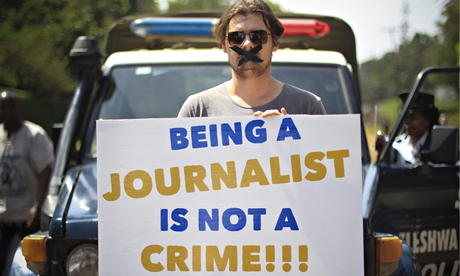
A foreign correspondent protests in Nairobi against the imprisonment of Al-Jazeera journalist Peter Greste and his colleagues in Egypt. Photograph: Dai Kurokawa/EPA
"A Dutch journalist has fled Egypt after it emerged she was one of 20 journalists accused last week of "fabricating news" and being party to an alleged terrorist plot.
Rena Netjes, Cairo correspondent for Holland's Parool newspaper and BNR radio, is among four foreigners and 16 Egyptians facing charges of spreading false news while allegedly working for television network al-Jazeera.
The case is part of what rights campaigners have said is a crackdown on free expression in Egypt.
Netjes was not initially thought to be involved in the case because her name was misspelt on the charge-sheet, and because she has never worked for al-Jazeera.
After her involvement became known, Netjes went into hiding for several days. Following an intervention from Dutch officials, Netjes was allowed to leave Egypt on Monday. Two British defendants – understood to be al-Jazeera reporters Dominic Kane and Sue Turton – had already left Egypt when the charges were laid last Wednesday.
Others accused in the case have not been so fortunate. Australian former BBC correspondent Peter Greste, Canadian-Egyptian bureau chief Mohamed Fahmy, and local producer Baher Mohamed have been in prison since a police raid on their rooms at Cairo's Marriott hotel in late December. Al-Jazeera reporter Abdullah al-Shami was jailed in August after being arrested at a protest, and is on hunger strike.
In a separate case, freelance broadcast journalist Hossam Meneai has claimed he was tortured while in jail on similar charges.
Al-Jazeera denies the charges against its journalists. In an email to the Guardian before flying to the Netherlands, Netjes described the accusations as "unbelievably crazy", and credited the Dutch embassy in Cairo with "saving my life".
Netjes said it was likely she had come under suspicion because she visited al-Jazeera's Fahmy at the Marriott a few days before he was arrested, for an interview about the insurgency in Sinai.
"This case is part of a violent campaign against the freedom of expression and journalism that we have never witnessed before, except during the dying days of the Mubarak regime, from October to December 2010," Gamal Eid, a leading Egyptian rights lawyer, and head of the Arabic Network for Human Rights Information, told the Guardian last week.
The government and its supporters say foreign media are distorting the situation in Egypt, which they argue is on the path to democracy."

No comments:
Post a Comment